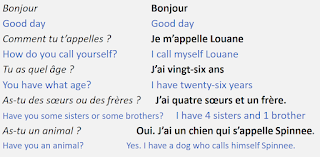I don't know how it's been for you, if you've followed developments in language teaching in England over the last year a bit, but for me, writing this blog has been useful to start to think through some of the issues and I am ready to make some decisions.
I am rewriting the booklets we use as a department. The headline for this blog is that I am going to make it much clearer to teachers and pupils how the learning can be broken down. And how we balance the focus on meaning and the focus on the form of language. The sub heading is that overall, I am going to change as little as possible.
Here's what I'm doing with Year 7 Unit 1, as an example.
Rather than take lots of little pieces (phonics, verb to have, verb to be, gender rules, high frequency vocabulary) and see what it adds up to, we will be starting with whole phrases, whole conversations. Year 7 pupils love hearing French and being pleased they can figure out what is being said. They love getting their tongues around sentences, and the challenge of being quick to reply. Teachers love having French as a medium of communication in their classroom right from the start. What we will do, is exploit those conversations for phonics, meaning, and grammar. Then we will work on the component parts so that pupils can move on from the scripted conversations. First of all to adapt them to themselves. And then to be able to vary and manipulate them more and more widely, using their growing knowledge of how the language works.
We are going to have real French characters through the booklet and reappearing in future units.
The first character is the actor and singer Louane. Here's the first dialogue for pupils to find out some basic information about her.
We will work on understanding what it says. But also what it literally means and the ways French is different to English.
We will exploit it for phonics. We use Rachel Hawkes / Comberton Village College Francophoniques. There are keywords and actions for the sounds. We work intensively on this so that the actions become linked not to the word, but directly to the sound. So the teacher can anticipate the pronunciation of the word comment with the dents action for the sound en.
Then we work on memorisation and fluency.
At this point, we are still ostensibly working on the original Louane dialogue, but I don't think pupils or teachers will be able to resist substituting their own details.
That's what happens next. We work on pets, numbers, months, family members. Each in turn exploited for phonics and grammar. So pets, with oiseau and poisson, works brilliantly for phonics. And it also means we have to tackle un / une. Where again, the issue of pronunciation is perhaps more critical than gender. Pupils do get gender (and increasingly refer to using the correct definite/indefinite articles as getting the "pronouns" right). But everything falls apart if their pronunciation of un / une is indeterminate. And with pets we introduce je and ai and our friend Mr Apostrophe. And je and ne and ai and pas. Again, in an expression with meaning first, before breaking it down. Not the other way round. And numbers and plurals.
And then similarly family members, numbers, months. All great for phonics. And then, the pupils are equipped to go back to the Louane dialogue and adapt and manipulate it.
Then we go through the process again adding personality (je suis and adjectival agreement) and physical description to the Louane conversation. And then to the pupils' own conversations. And then to seeing the Louane information written up in the third person. And the pupils writing about themselves in the third person.
The next step will be to introduce Bigflo and Oli as characters. And go through the same process, to introduce a conversation with vous / nous and written up texts with ils.
It's a tricky first unit to do as a booklet. So much of it is spoken, it's not going to be booklet based! When I was working on rewriting the Year 8 Unit 1 booklet, I found that sequencing the focus on grammar and phonics didn't mean you were making anything that added up to how a lesson would work. So this Year 7 Unit 1 has turned out to be not so much a booklet as a series of powerpoints. Which teachers can then adapt.
This the key thing. What I am doing is about how we manage consistency and individual strengths in the department. This isn't about me, or a theoretical debate about language learning. This is about my own specific individual department that has had staffing fluctuations and where we are all still only just getting back to working together in the long (and not over yet) aftermath of covid.
I haven't invented or added anything I don't already do or that wasn't already in the scheme of work. But it is spelling out and making clear how everything is supposed to work. Maybe some teachers focus relatively more on the building blocks of language but don't develop how well pupils can use it. Maybe some teachers' pupils have a lovely accent and fluent responses, but don't have such a good understanding of the individual building blocks. I know consistency is in fashion, but this is all about balance. Florencia Henshaw sent me a picture of the swing of the pendulum which made me think about it in a different way. We know that the politics of language teaching swing from one extreme to the other. But Florencia's image is of the Newton's Cradle, where the ball in the middle is constantly bashed from either side, but actually does not move at all. That's us in the middle. Trying to keep on making learning happen in our lessons.







No comments:
Post a Comment